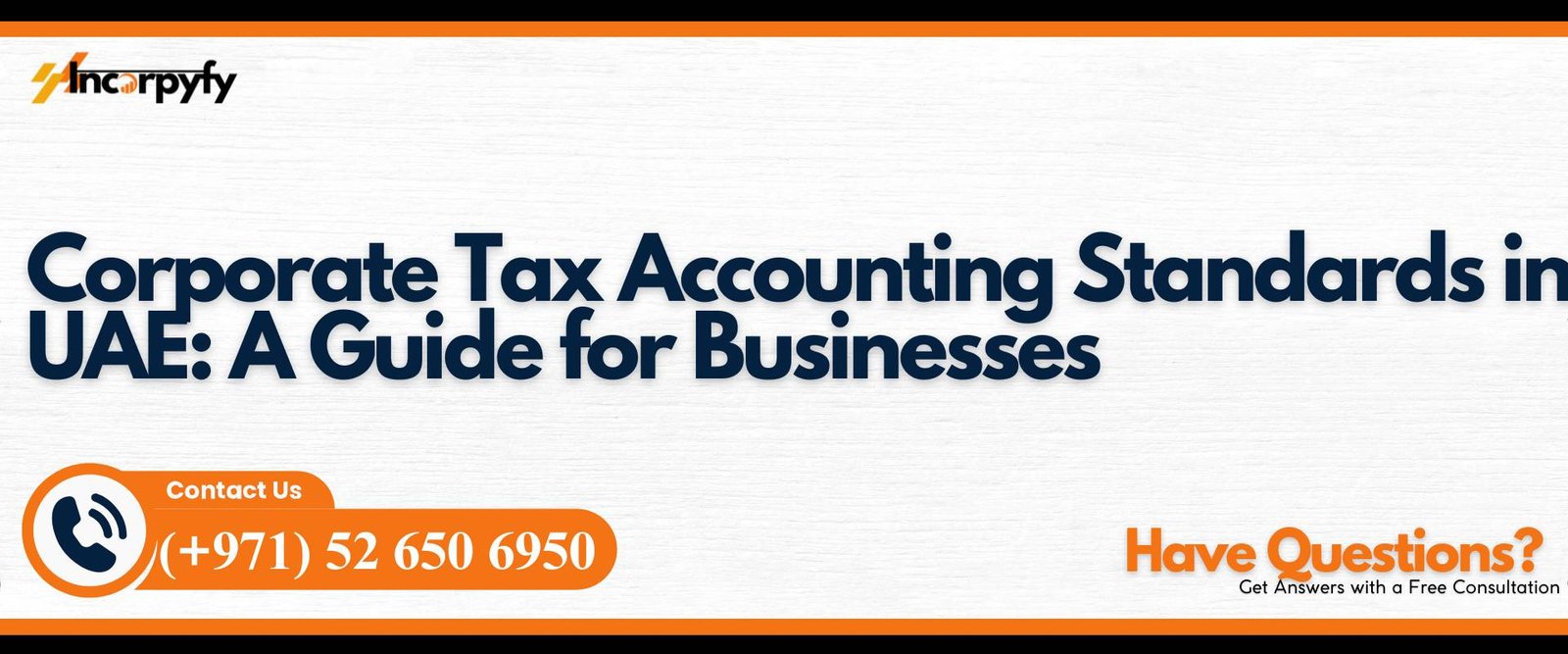
The introduction of corporate tax in the UAE has changed the financial and compliance landscape for businesses. This article provides a detailed guide on the corporate tax accounting standards in UAE, explaining how companies must adopt International Financial Reporting Standards (IFRS) to prepare and submit accurate financial statements. It covers the key elements of corporate tax compliance such as revenue recognition, allowable deductions, capital allowances, transfer pricing, and the role of audits. Businesses are required to follow proper bookkeeping, maintain documentation for at least seven years, and file returns within nine months of the tax period end. The article also highlights challenges like mismatched records and offers best practices such as using accounting software and consulting tax experts. Whether you’re a small business, free zone entity, or large corporation, following these standards ensures legal compliance, avoids penalties, and builds financial credibility in the UAE’s evolving tax system.
Understanding Corporate Tax in the UAE
The introduction of corporate tax in the UAE has marked a significant shift in how businesses handle their finances. Once known for its tax-free environment, the UAE now requires registered businesses to comply with federal corporate tax regulations, including proper accounting and transparent financial reporting.
Overview of the UAE Corporate Tax System
The UAE corporate tax system applies a standard tax rate of 9% on net profits exceeding AED 375,000 annually. Businesses with profits below this threshold remain exempt, but they must still maintain proper accounting records and file returns. This flat tax rate ensures fairness while aligning the UAE with global economic practices.
Why Corporate Tax Matters for Businesses
Adopting corporate tax accounting standards in UAE is no longer optional. It’s a legal obligation. It allows businesses to:
- Remain compliant with Federal Tax Authority (FTA) regulations
- Avoid penalties and audits
- Strengthen credibility and investor confidence
- Track performance and make informed financial decisions
What Are Corporate Tax Accounting Standards in UAE?
Corporate Tax Accounting Standards in UAE refer to the financial rules and frameworks businesses must follow when calculating and reporting their taxable income. These standards ensure transparency, accuracy, and compliance with UAE’s tax laws. Most companies must align with IFRS to meet the Federal Tax Authority’s regulatory requirements.
Definition and Purpose of Accounting Standards
Corporate tax accounting standards are a set of rules that guide how companies record, manage, and report financial information. These standards ensure consistency, transparency, and accuracy in financial statements, which are now vital for corporate tax filing in the UAE.
Who Needs to Comply with These Standards?
All taxable persons, including:
- Mainland LLCs
- Free zone entities (unless exempt)
- Branches of foreign companies
- Professional service firms
Even if a company qualifies for 0% tax due to small business relief, it must still prepare proper financial statements and maintain documentation based on approved accounting standards in the UAE.
Applicable Accounting Standards for Corporate Tax Compliance
Applicable accounting standards for corporate tax compliance in the UAE primarily include the International Financial Reporting Standards (IFRS). All businesses must prepare financial statements according to IFRS unless exempt. These standards ensure consistency in revenue recognition, expense classification, and asset depreciation, which are essential for accurate tax assessment and regulatory compliance.
International Financial Reporting Standards (IFRS)
The UAE mandates the use of IFRS (International Financial Reporting Standards) for preparing financial statements. IFRS ensures global consistency and is particularly useful for international investors, auditors, and regulators reviewing business financials.
Small businesses may be allowed to use IFRS for SMEs, which is a simplified version for companies with limited resources or lower turnover.
UAE-Specific Guidelines and MOF Requirements
While IFRS is the foundation, the Ministry of Finance (MOF) and FTA have issued additional UAE-specific tax reporting standards, including:
- Reporting of adjusted accounting income
- Specific treatment of disallowed expenses
- Recordkeeping for related-party transactions
These local guidelines help ensure accurate filing and proper reconciliation between book profits and taxable income.
Key Components of Corporate Tax Accounting
To comply with corporate tax accounting standards in UAE, businesses must understand how to manage different financial components.
Revenue Recognition and Taxable Income
Revenue should be recognized in line with IFRS guidelines, not just based on when cash is received. The taxable income is then calculated by making adjustments to accounting profits, such as:
- Excluding non-taxable income
- Adding back non-deductible expenses
This ensures your tax return aligns with your audited financial statements.
Allowable Deductions and Disallowed Expenses
Allowable deductions include:
- Salaries
- Rent
- Utilities
- Advertising
- Business travel
Disallowed expenses include:
- Fines and penalties
- Bribes or illegal payments
- Personal or capital expenses not related to the business
Understanding these categories helps reduce errors in calculating net taxable income.
Depreciation and Capital Allowances
You must apply the correct capital allowance rules when claiming depreciation on:
- Equipment
- Machinery
- Vehicles
- Buildings (in some cases)
The method of depreciation may differ between accounting standards and tax calculations, so businesses need to maintain two versions of asset registers if necessary.
Transfer Pricing and Related Party Transactions
Companies that deal with related parties must comply with transfer pricing regulations in the UAE. This includes:
- Proper documentation of intra-group transactions
- Maintaining arm’s length pricing
- Submitting Transfer Pricing Disclosure Forms
Failing to comply can lead to adjustments and tax penalties.
How to Prepare Financial Statements for Tax Filing
To prepare financial statements for tax filing in the UAE, businesses must ensure accurate bookkeeping, follow IFRS guidelines, and maintain updated ledgers. Statements should reflect true income, expenses, and assets. Using accounting software, reconciling accounts, and working with certified auditors helps ensure compliance with UAE’s corporate tax reporting standards.
Chart of Accounts and Ledger Accuracy
Your chart of accounts should align with reporting standards and reflect all sources of income and expenses. Accurate bookkeeping is vital for:
- Smooth audits
- Fast reconciliations
- Legal tax filing
Separate your business finances from personal accounts to avoid mismatched ledgers.
Accrual vs. Cash Basis Accounting
The UAE generally follows the accrual basis of accounting, meaning:
- Income is recorded when earned
- Expenses are recorded when incurred
Cash basis accounting is not compliant unless explicitly approved under small business relief provisions.
Audit Requirements for Businesses
Audits are not always mandatory, but for tax purposes:
- Large companies must undergo external audits
- Free zone entities seeking tax exemption must submit audited reports to maintain eligibility
- Audited financials give credibility and support tax returns
Corporate Tax Filing and Reporting Obligations
Corporate tax filing and reporting obligations in the UAE require businesses to submit annual tax returns within nine months from the end of their financial year. Companies must include audited financial statements, maintain proper records for seven years, and comply with Federal Tax Authority (FTA) guidelines to avoid penalties and ensure legal compliance.
Tax Period and Return Filing Deadlines
The corporate tax year in the UAE typically aligns with the financial year. The first corporate tax return must be filed within 9 months after the end of the relevant tax period.
For example:
- Year-end: 31 Dec 2024
- Filing deadline: 30 Sep 2025
Required Documentation and Financial Records
Businesses must retain:
- General ledgers
- Bank statements
- Invoices and receipts
- Contractual agreements
- Employee payroll records
- Tax computation worksheets
Records must be maintained for 7 years, as per FTA guidelines.
Role of Approved Auditors and Tax Agents
- Approved auditors ensure your financials are IFRS-compliant
- Registered tax agents can represent you before the FTA
- They help in handling audits, appeals, and penalty resolutions
Challenges Businesses Face in Adopting Accounting Standards
Businesses in the UAE face several challenges when adopting corporate tax accounting standards, including lack of in-house expertise, inconsistent bookkeeping, and unfamiliarity with IFRS. Smaller firms may struggle with documentation, software integration, or hiring qualified professionals. Overcoming these issues is essential to maintain compliance and avoid fines under the new tax system.
Lack of Internal Accounting Infrastructure
Small companies often lack:
- Trained accountants
- In-house bookkeeping systems
- Financial awareness
This can lead to delays in filing, errors in reporting, and non-compliance penalties.
Inconsistencies in Recordkeeping
Disorganized financial records can result in:
- Missing transactions
- Unreconciled balances
- Incorrect expense classifications
This affects both the accuracy of tax filings and audit readiness.
Mismatch Between Financial and Tax Reports
Many businesses rely on manual calculations that do not reconcile with their financial reports. This creates red flags during audits and can lead to FTA scrutiny or rejections.
Best Practices for Corporate Tax Accounting in UAE
Best practices for corporate tax accounting in UAE include maintaining accurate financial records, using IFRS-compliant software, conducting regular audits, and staying updated with FTA guidelines. Businesses should consult qualified tax advisors to ensure proper deductions, timely filings, and complete documentation. Following these practices helps ensure compliance and avoids tax-related penalties.
Regular Bookkeeping and Documentation
- Update records monthly
- Reconcile bank and supplier statements
- Keep digital and physical copies
- Backup all documents securely
Routine bookkeeping keeps you prepared for both filing and audits.
Using Accounting Software Compliant with UAE Standards
Adopt software that supports:
- IFRS formats
- Tax adjustments
- Multi-currency ledgers
- FTA-compliant invoices
Examples include QuickBooks, Zoho Books, Xero, and Tally (customized for UAE tax settings).
Consulting with Tax Experts and Accountants
Don’t wait until the deadline. Hire:
- Corporate tax advisors in UAE
- Certified accountants
- VAT and corporate tax consultants
They help you navigate evolving tax regulations and avoid penalties, ensuring accurate filing aligned with corporate tax accounting standards in UAE.
Conclusion
As corporate tax becomes an integral part of the UAE’s business environment, adopting the right corporate tax accounting standards is critical. Businesses must follow IFRS, maintain updated records, calculate taxable profits accurately, and comply with filing deadlines.
This guide serves as a practical framework for companies navigating UAE’s evolving tax landscape. Whether you’re a small business owner, a finance executive, or an accountant, understanding these standards is essential for compliance, sustainability, and growth.
For tailored assistance, many firms turn to corporate tax advisors in UAE who specialize in accounting setup, tax planning, and FTA audit preparation. Being proactive not only prevents penalties—it positions your business for long-term credibility.
FAQs
Are IFRS standards mandatory for tax filing in UAE?
Yes, IFRS is the officially adopted standard. Businesses must prepare their financial statements in accordance with International Financial Reporting Standards for corporate tax compliance.
What is the minimum turnover for corporate tax to apply?
Corporate tax applies to net profits above AED 375,000 annually. Even if you earn less, you must register and maintain financial records.
Can I use cash basis accounting for my business?
The UAE uses accrual accounting as the default method. Small business relief may permit cash basis in certain cases, but FTA approval is required.
How long do I need to keep financial records?
You must maintain financial and tax-related records for at least 7 years from the end of the relevant tax period.
Do Free Zone companies need to comply with tax accounting standards?
Yes. Even if a Free Zone entity is eligible for 0% tax, it must still follow IFRS, submit audited reports, and maintain proper tax records.






